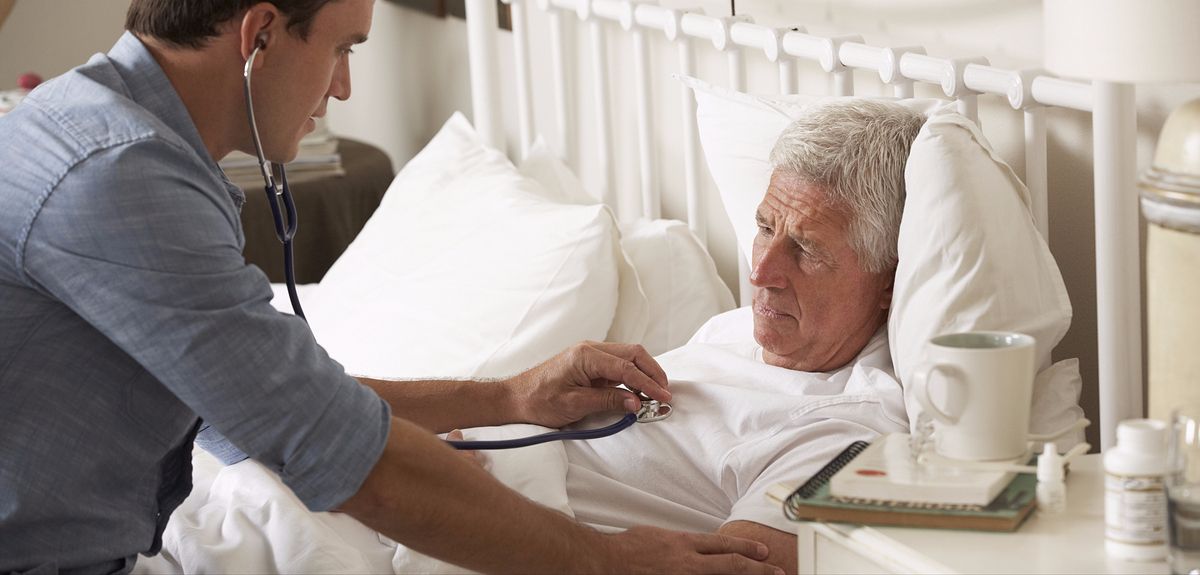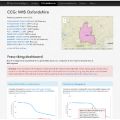
Image credit: Monkey Business Images/ Shutterstock
Researchers call for more focus on ways to improve end of life care at home
A study from Oxford University has looked at how out-of-hours GP services are being used to support patients dying at home.
In a service evaluation published in the British Journal of General Practice, Rebecca Fisher, Daniel Lasserson and Gail Hayward worked with Oxford Health NHS Foundation Trust to look at the use of the GP out-of-hours service for Oxfordshire over four years, finding that at least 1 in every 100 contacts was for palliative – end-of-life – care.
Dr Rebecca Fisher said: 'Out-of-hours services cover more than two-thirds of the hours in a year (from 6.30pm to 8am daily and 24/7 at weekends and bank holidays). Despite this, until now, no one had looked at how patients with palliative care needs use out-of-hours services.'
Prof Dan Lasserson said: ‘We found that of nearly half-a-million patient contacts over four years, just over 6000 were for end-of-life care, which equates to almost 70,000 out-of-hours contacts each year in England as a whole. Patients with palliative care needs were most likely to contact the out of hours service in the daytime at weekends, coinciding with the busiest period for the service. Compared to overall contacts with the out of hours service, there were fewer patients from very deprived areas seeking care at the end of life’.
The team say that their research raises many questions, and that more research is urgently needed. Dr Gail Hayward said: ‘We now know that lots of people are using out of hours GP services for end of life care. We need to carefully consider how we can best design services to meet the needs of this patient group.
‘Since the majority of contacts were in weekend daytime hours, the possibility of a dedicated palliative service covering this time period should be explored. We also raise questions about potential inequality in access to care at the end of life, and more research is needed to understand the requirements of a community based palliative care service that could provide high quality 24/7 to everyone who needs it’.
More information
In January 2015 the Palliative and end of life care Priority Setting Partnership identified ‘the best ways of providing palliative care outside of working hours to avoid crises and help patients to stay in their place of choice’ as the number one priority for palliative care research.
Between June 2010 and August 2014, Oxfordshire’s out-of-hours service had 511,503 patient contacts. 14,572 had to be excluded from the analysis. Of the 496,931 contacts analysed, 6045 (1.2%) were coded as palliative care, caring for 3760 people. Applied to the 5.8 million patient contacts across England, this equates to 69,600 palliative care patient contacts for around 43,291 patients.
The paper, Out-of-hours primary care use at the end of life: a descriptive study, is published in the British Journal of General Practice (doi:10.3399/bjgp16X686137).
 Statins do not cause the majority of side effects listed in package leaflets
Statins do not cause the majority of side effects listed in package leaflets
 Activism proves a stimulating topic at Sheldonian Series event
Activism proves a stimulating topic at Sheldonian Series event
 New Oxford-led initiative launches to train future leaders in transformative technologies for pharmaceutical research
New Oxford-led initiative launches to train future leaders in transformative technologies for pharmaceutical research
 Sunday GP appointments unlikely to meet patient needs
Sunday GP appointments unlikely to meet patient needs
 NHS GP prescribing data open for all
NHS GP prescribing data open for all